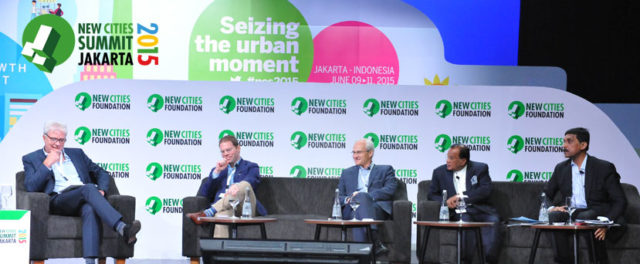Can Cities Really Save the World
August 7, 2015 — Blog
This post is part of our Seizing the Urban Moment discussion series, following the fourth edition of the New Cities Summit in Jakarta in June 2015.
Has too much hope been placed on cities? Four experts assembled at the New Cities Summit to address this question, in a discussion moderated by Nick Clark, Environment Editor at Al Jazeera English.
Greg Lindsay, Senior Fellow at NewCities, suggested that the session title was based upon the assumption that the world is only half urbanized. He proposed a different perspective, where the world is seen as completely urbanized – with rural areas integrated as support systems to a city-led global society.
“Rather than thinking about the city as an island, we really need to think about cities as a delta that moves vast amounts of people,” he said.
Resource consumption from agriculture, logistics and other areas are not currently showing up in urban calculations, Lindsay warned, causing over-optimism about the benefits of large cities.
The Mayor of Colombo added: “70% of the population is going to live in cities, but they are not geared for those challenges.” He added: “You cannot discourage the people coming, but the people who are living in the cities themselves do not find the facilities [they need].”
The problem of urbanization is not one for cities alone, said Mayor Muzammil. It requires the assistance of national governments, international organizations and private companies to help build the technology, infrastructure and support networks that will enable city leaders to cope.
Siddhartha Sengupta of the State Bank of India noted that “cities have to save the world” because urbanization is inescapable. He called for three concepts. First, sustainability. Cities must use a sustainable amount of carbon, and also have an economic model that lasts – learning from the boom and bust of Detroit. Second: scalability. Cities must be able to cope with expansion and do so in a measured manner. Third is social justice. Cities must tackle the vast inequality between rich and poor to prevent social problems and collapse.
Patrik Regårdh, Head of Strategic Marketing at Ericsson, asserted that technology can help with these challenges, particularly scalability. Technology allows organizations to act in a “fundamentally different way: Much faster, much leaner, much more distributed,” he said. They can also allocate resources more efficiently on a needs basis, he noted, giving cause for optimism.
Nick Clark brought up the topic of climate change. Sengupta responded that “the smart city is not about smart buildings”, but about “how smart it is in an environment-friendly and sustainable way.” He warned that unless there are incentives, and most importantly disincentives, cities will not be built in the right way.
To conclude, Greg Lindsay commented that political governance and economic governance have become completely misaligned with each other. The notion of “the city” has gone far beyond municipal boundaries. The question of how to realign governance should be treated urgently, he argued.

Speakers
Greg Lindsay, Senior Fellow, Mobility Initiative, NewCities – @Greg_Lindsay / @newcitiesfound
Patrik Regårdh, Head of Strategic Marketing Ericsson – @ericsson
Ahamed J.M. Muzammil, His Worship the Mayor, Colombo, Sri Lanka
Siddhartha Sengupta, Group Executive Officer – International Banking, State Bank of India
Moderator: Nick Clark, Environment Editor, Al Jazeera English – @NickClarkAlJaz